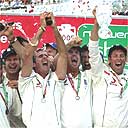Chicago Cubs 1908 - Present
Starting with the organisation that has explored the concept of losing with such painstaking detail for nearly a century now, such that, if there were a competition for the biggest losers, they would win, except that would be a paradox, thus denying them even that honour.
The last time the Cubs won the World Series was 1908, the year in which Henry Ford produced his first Model T automobile, Robert Baden Powell began the Boy Scout movement and the women's suffrage movement was in the midst of a strategy of civil disobedience. Oh, and Australia regained the Ashes with a 308 run victory over England (England did manage to win one test however).
World Series would be a fine thing - this crowd can't even get their hands on a National League title, last winning a 'pennant' in 1945, when Frank Sinatra was getting chased by bobbysoxers and it was still ok to nuke a city.
This empire of failure appointed a new high-priest of haplessness in 2003, when, a mere two outs from getting to the World Series in the NL championship game against the Florida Marlins, fan Steve Bartman attempted to catch a foul ball instead of allowing outfielder Moises Alou take the catch to get another out. The Cubs subsequently collapsed, the Marlins won the World Series, and the world returned to its axis.
Manchester United 1968-1993
Although currently being slavishly imitated by Liverpool with their take on the Crumbling Empire/Subsequent Famine trick, the Reds of Merseyside have some way to go before matching the years in the wilderness endured by United between the glorious seasons of 1966/67 and 1967/68 in which they won the league and European Cup, and their return to the pinnacle of English football in 1993/93.
United were an object lesson in the problems of succession: Matt Busby's retirement in 1969 saw a succession of manager's fail to match the achievements of the Scot's 24 years in charge. Wilf McGuinness and Frank O'Farrell were too meek, Tommy Docherty too mad, Dave Sexton too defensive and Big Ron too tanned. Famously, it took Alex Ferguson almost seven years to drag the club to a title.
The nadir was a relegation in 1974, which Liverpool have, as yet, failed to match. Perhaps as heartbreaking was the failure to win the 1992 title, the last First Division championship they would compete for, which Leeds won after United lost 2-0 against, ahem, Liverpool. Still, they've rather made up for it since.
2005 British & Irish Lions
New Zealand could hardly have been a less hospitable place for the 2005 Lions to visit had the host country arranged a tour match against some Orcs left over from the filming of Lord of the Rings. The test results were by no means the worst ever either, the tourists having gotten smacked up four times in 1966 and 1983, rather than the mere three whippings they took in 2005.
But the way the tour was conducted, when added to the whitewash on the field, sets this tour up for particular derision. This was Clive Woodward's Heaven's Gate, the folly to end all follies. From the whole 'Power of Four' nonsense (which included a specially commissioned and immediately forgotten anthem) to the vast massed ranks of backroom staff that shuffled along in their wake, verily this was a carnival of cluelessness.
Being exactly the kind of Englishman whose superciliousness plays poorly in the Antipodes, Woodward was always up against it. But when his tactics consisted of the dusting down of a manual entitled "England 2003 - Biff, Bash and Wilko" observers were entitled to wonder whether more time had been spent on assembling the 26-strong backroom staff than in devising a remotely cogent gameplan.
If Willie John McBride had issued his famous '99' call in 2005, this lot would looked around for the ice-cream van.
 As you've probably figured by now, this sport business has a slight tendency toward the dramatic. In fact, I've long thought of sport as soap opera for men. Improbable storylines, pantomime villains, joy, heartache and then Gary Lineker presents the omnibus so you can catch up on what you've missed.
As you've probably figured by now, this sport business has a slight tendency toward the dramatic. In fact, I've long thought of sport as soap opera for men. Improbable storylines, pantomime villains, joy, heartache and then Gary Lineker presents the omnibus so you can catch up on what you've missed.









